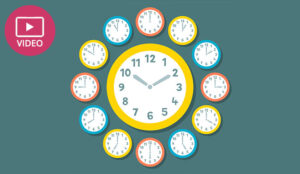Shift patterns can be a sensitive issue in any contact centre. Get them wrong and you risk higher absence rates, low morale, and staff turnover.
But done right, scheduling can support wellbeing, improve retention, and create a more engaged and productive team.
One of the most common mistakes is assuming all agents want the same kind of shift.
To find out more, we asked Chris Dealy, WFM Evangelist at peopleware (formerly injixo), to explain how contact centres can help to tackle attrition, agent burnout, and absence by not making assumptions about unsociable hours.
Video: Tackle the 3A’s: Don’t Make Assumptions About Unsociable Hours
Watch the video below to hear Chris explain that one way to tackle attrition, agent burnout, and absence is to not make assumptions about unsociable hours:
With thanks to Chris Dealy, WFM Evangelist at peopleware (formerly injixo), for contributing to this video.
This video was originally published in our article ‘Tackle the 3 A’s – Absence, Agent Burnout, and Attrition’
Three Reasons You Shouldn’t Make Assumptions About Shifts
Making assumptions about shift preferences can contribute to avoidable issues like burnout, absenteeism, and staff turnover.
“Shift patterns are a very emotive subject. Get them wrong and you’ll end up with excessive absence levels, and high turnover.”
Here are three reasons why taking a more flexible, inclusive approach can help reduce those risks:
1. Not Everyone Wants Traditional Hours
It’s a misconception that every agent prefers Monday to Friday, 9 to 5. Many people actively prefer shifts outside of standard hours.
Early mornings, late evenings or weekends may suit their lifestyle better – whether for family reasons, study, or simply personal preference.
“Obviously, you can’t guarantee anything, but also don’t assume that everyone wants to work Monday to Friday 9 to 5. Some people actually relish the idea of working what used to be called unsociable hours and would still give you good coverage while giving people shifts closer to what they want. “
These so-called “unsociable” hours can still provide solid coverage for your operation, while giving agents the kind of flexibility they actually value.
2. Agents Want to Be Heard
Agents appreciate having a say in how they work. Asking them about their preferred shift patterns not only helps inform better scheduling decisions, but also builds trust.
“Agents love having a say in the scheduling process, so ask them what their ideal shift pattern looks like.”
Even if you can’t accommodate every request, involving people in the process makes them feel respected.
When employees feel heard, they’re more likely to be engaged and less likely to be absent or leave the role.
3. Flexibility Improves Retention
Giving agents more control over their schedules through self-service tools can help prevent burnout and reduce turnover, as Chris explains:
“Think about giving agents the opportunity to bid for shifts, see what their colleagues’ shifts look like, specify their availability, book time off, or swap shifts on a self-service basis.”
Letting them bid for shifts, log availability, swap shifts, or request time off makes work more manageable – and supports a healthier work–life balance.
This kind of flexibility leads to a stronger sense of autonomy and often results in better performance and morale.
“These are all things that are extremely effective in reducing stress, and reducing turnover, and engagement options like that not only reduce absenteeism and attrition, but they’re also going to instil in agents a feeling of being valued and in control of their work–life balance.
Empowered agents are more committed and motivated, and that translates into higher productivity, better morale, and reduced turnover, and absences in your contact centre.”
If you are looking for more great insights from the experts, check out these next:
- Two Strategies to Improve First Contact Resolution (FCR)
- 3 Reasons to Involve Agents in Tech Purchases
- A Sign You Need Speech Analytics
- Using IMPACT to Drive Better Outcomes With CCaaS
Author: Robyn Coppell
Reviewed by: Xander Freeman
Published On: 21st Aug 2025 - Last modified: 25th Sep 2025
Read more about - Video, Absenteeism, Attrition, Chris Dealy, Peopleware, Shift Patterns, Videos
















